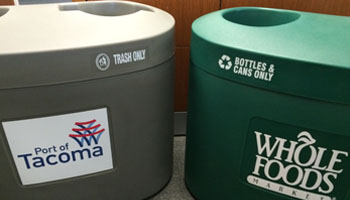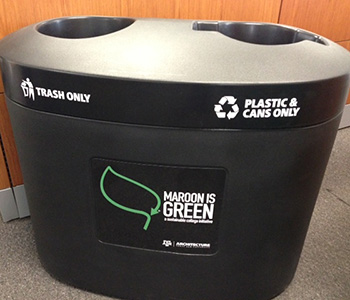By Nancy Ferguson

The motto “Reduce, Reuse, and Recycle” is a familiar call for those who care about protecting the earth and conserving its resources. It is often seen in environmental literature and heard among those who seek to preserve the ecology of this fragile planet. As much as we may agree with the values of ecology, it can be overwhelming to establish policies and practices at a camp to actually carry out our good intentions.
Since it is often difficult to translate the motto into a business plan--particularly when it affects the limited financial resources of a camp--here are some practical suggestions that are both environmentally friendly and cost-effective.
Reuse
1. Get more use from printer and copier paper.
- Buy recycled paper and tell campers and guests that everything is printed on this type of paper. Although it may be slightly more expensive, the cost will decrease as more and more people use the paper.
- Use both sides of printer paper. Unless there is a lot of moisture in the camp office, printer paper can be reused for drafts of documents or internal memos.
- Cut used paper into 5½-inch by 4-inch scraps, and use it instead of printed memo paper or expensive sticky notes. Attach them with reusable paper clips.
2. Promote donations of used items.
- Collect all the gently used donations you can’t use, and hold a yard sale at an open house or a local community event. Use the money for camperships or to purchase recycling bins.
- Promote the event and invite friends of the camp to donate items, or they can set up their own booth for a small fee.
3. Keep equipment in good repair.
Although the immediate cost of a repair may seem daunting, the long-range savings make it worthwhile. Not only will it save the expense of new equipment, but it will save that old equipment from taking up space in a landfill.
- Look into bartering. Perhaps a nearby school, camp or business has equipment you need once or twice a year, and you have equipment they can use occasionally. Then share the upkeep of thee equipment.
4. Eliminate Styrofoam and plastic bottles.
Both are expected to stay in landfills for up to a million years before breaking down!
- Carry a coffee mug or water bottle, and encourage staff members to do the same. Model this behavior at community meetings or presentations. This is a simple step for those interested in saving the earth’s resources.
- Encourage campers to bring a water bottle to camp--or to buy one at the camp store--to reuse often. Make arrangements to wash the bottles during the week--perhaps during one meal before the dishes come back. Educate campers about the landfill realities of plastic bottles as part of their orientation to camp.
- Invite off-season guests to bring their own cup or bottle, or to mark one of the camp’s bottles for use during the event. Think of how many times people only use a cup or glass once and then get a fresh one because they don’t know where the first one is. Again, remind guests they can continue to make this same effort at home. Post information about the long life of plastic and Styrofoam and their effect upon landfills.
Reduce
5. Buy products with less packaging and/or packaging made with recycled content.
Pay attention to the packaging on products. How much plastic is used to protect the product? Recycle cardboard packaging.
- One advantage camps have is the ability to buy in bulk. Encourage the food-service director to make bulk purchases whenever possible.
6. Eliminate disposable products.
Go for reusable, fixable and washable items.
- Replace paper napkins with cloth ones in the dining room. Although this may be a costly one-time purchase, the money--and trees--saved will be considerable.
- Replace paper towels in the kitchen with a bag of rags to wipe hands and wash pots, pans and countertops. The cost of detergent and water will be less than continuously purchasing paper.
7. Choose CFL light bulbs.
CFL bulbs (Compact Fluorescent Light) use 75-percent less energy than incandescent bulbs.
- According to the EPA, every incandescent bulb replaced with a CFL saves enough energy to light 3 million homes for a year. Think what this would mean for a camp’s electric bill!
- One camp invited everyone attending a cleanup event to bring several light bulbs. By the end of the day, all of the light bulbs in camp had been switched.
8. Save water.
- Place a sign over each sink at camp stating, “Please turn off the water while brushing your teeth. You will save 3 to 5 gallons of water for every minute the water doesn’t run.”
- Turn down hot water heaters to 110 F, put displacement devices in toilet tanks, and install aerators in showerheads. One of these will save energy and water; all of these will save a lot of energy (therefore money) and water.
Recycle

9. Add recycling containers with the “recycle” logo.
- Put a container next to every soda machine and those places--especially the staff lounge--where people drink soda.
- Near each container, post information about the energy and resources saved by recycling one can.
- Make recycling containers from regular trashcans, and have a contest to see which camp group can spraypaint the most creative design.
10. Create a recycling area.
- Schedule a time for campers to help in the recycling area. Explain the need for flattening boxes, sorting glass by color, and squashing plastic bottles and aluminum cans.
- Include information about the benefits of recycling and conserving resources in sessions.
- Purchase cotton shopping bags in bulk so every camper can tie-dye or screen-print a bag to take home. Encourage them to write a letter to their parents explaining how the bag will save trees and reduce the use of plastics.
- Contact a local waste-management system for details on which items are accepted for recycling, and where they can be taken.
- Plan a session during staff training so that everyone understands the recycling practice.
Source: campbusiness.com






































